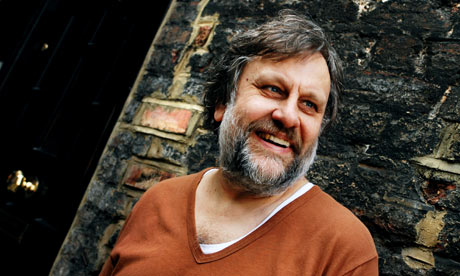
Often referred to as "the Elvis of cultural theory", there is a case to be made that Slavoj Žižek is really the Ken Dodd of post-Lacanian Hegelianism. He is a famous crowd-pleaser who can tailor his routines both to dusty academics and Occupy protesters, much as Doddy prides himself on shaping his jesting to specific towns and cities in the UK. And, like Dodd – the Shakespeare of standup – he goes on and on and on: there's always more dialectic where the last bit came from. (I remember him apologising at one appearance that he only had time to give a very brief answer to an audience question, before beginning a 30-minute monologue.)
Nonetheless, we in the books department were a little confused by news of a coffee table book of The Collected Jokes of Slavoj Žižek, published at the beginning of April 2011 in a limited edition of one. These suspicions were reinforced by the fact that it appeared on a website called themickeymouseclub.biz. Could they be serious? There's certainly no shortage of incredible nonsense written about him on the web. Remember the widely reported story of his romantic tryst with Lady Gaga?
But this one appears to be true. A bit of googling indicates that it's an art statement by Norwegian conceptualist Auden Mortensen, and a call to publisher Flamme Forlag reveals that they have plans for a rather bigger edition, of 500, due next month.
The book extracts some of Žižek's gags, presenting one joke, with lots of white space, facing another. Whether this is a dialectical manouevre in the manner of Adorno's Minima Moralia, or just a way to magnify Slavoj's taste for seriously off-colour material, I cannot say (certainly without having seen an actual copy of the actual book). But the mickeymouseclub site shows photographs of some of the jokes, and here's a flavour of some of the more printable ones:
There is an old joke about socialism as the synthesis of the highest achievements of the whole of human history to date: from prehistoric societies it took primitivism; from the Ancient world it took slavery; from medieval society brutal domination; from capitalism exploitation; and from socialism the name …
… Let us, in passing, be attentive to the homology between this "sceptical paradox" and the structure of a joke Lacan often refers to: "My fiancée never misses an appointment with me, since the moment she misses it, she is no longer my fiancée." - "I never make a mistake in applying a rule, since what I do defines the very rule."
Jokes have of course been central to Žižek's ascension to superstardom. As he told Stuart Jeffries last year: "I should not, speaking frankly, be this man who talks about The Dark Knight and Hegel, about the value of WikiLeaks and Lady Gaga. I should be a mediocre philosophy professor in Ljubljana." And his jokes can sometimes be very good, though the ones in The Collected Jokes don't seem to include some of my favourites, like the superb riff on why the Iraq war followed the cultural logic of chocolate laxative.
Comedy is, of course, a crucial – though not usually that amusing – term in the Hegelian philosophy which is central to Žižek's philosophical project. Likewise in the snaky logic of Lacan, comedy has its role, while rarely raising too many titters.
And in the way that Žižek puts his two masters, Lacan and Hegel, to work on modern society he is supremely gifted at showing how the internal contradictions of late capitalism make themselves ludicrously obvious – and funny – if, like him, you're good at looking.

